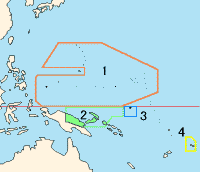|
Gosuke Yokota
Gosuke Yokota ( ja, 横田郷助) (September 23, 1880 – October 11, 1931) was the second Governor of the South Seas Mandate (1923–1931). He died in office. He was from Yamaguchi Prefecture. He was a graduate of the University of Tokyo , abbreviated as or UTokyo, is a public research university located in Bunkyō, Tokyo, Japan. Established in 1877, the university was the first Imperial University and is currently a Top Type university of the Top Global University Project by .... 1880 births 1931 deaths Governors of the South Seas Mandate Japanese Home Ministry government officials University of Tokyo alumni People from Yamaguchi Prefecture {{Japan-politician-stub ... [...More Info...] [...Related Items...] OR: [Wikipedia] [Google] [Baidu] |
Yokota Gosuke
Yokota ( ja, 横田, 與古田, etc.) may refer to: * 6656 Yokota, an asteroid * Yokota Shōkai, a Japanese film company Places * Yokota Air Base, a US Air Force Base located in Tokyo, Japan * Harima-Yokota Station * Iyo-Yokota Station * Yokota, Shimane ** Izumo Yokota Station * Iwami-Yokota Station People with the surname * Yokota family (born 1930s) * Jaguar Yokota (born 1961), professional wrestler * Jun'ya Yokota (1945-2019), science fiction writer and cultural historian * Katsumi Yokota, video game designer * Kazuyoshi Yokota (?–2011), anime director *, Japanese rhythmic gymnast * Mahito Yokota, video game composer * Mamoru Yokota, anime illustrator * Masato Yokota (born 1987), athlete * Megumi Yokota (born 1964), Japanese national abducted by North Korea * Misao Yokota (born 1917), freestyle swimmer *, Japanese table tennis player * Shigeaki Yokota (born 1969), professional Go player * Susumu Yokota (?–2015), composer * Tadayoshi Yokota (born 1947), vo ... [...More Info...] [...Related Items...] OR: [Wikipedia] [Google] [Baidu] |
Governor Of The South Seas Mandate
The Governor of the South Seas Mandate (officially known as the Director of the South Sea Agency) was an official who administered the South Seas Mandate, a Class C League of Nations mandate in the Pacific Ocean under the administration of the Empire of Japan, as part of the Japanese colonial empire, between 1922 and 1944. The territory consisted of islands awarded to Japan by the League of Nations after World War I, prior to which they had been part of the German colonial empire. During World War II, the United States captured the islands from Japan. After World War II, the United Nations placed the territory under the United States trusteeship as the Trust Territory of the Pacific Islands. The islands are now part of Palau, Northern Mariana Islands, Federated States of Micronesia, and Marshall Islands The Marshall Islands ( mh, Ṃajeḷ), officially the Republic of the Marshall Islands ( mh, Aolepān Aorōkin Ṃajeḷ),'' () is an independent island country and micro ... [...More Info...] [...Related Items...] OR: [Wikipedia] [Google] [Baidu] |
Yamaguchi Prefecture
is a prefecture of Japan located in the Chūgoku region of Honshu. Yamaguchi Prefecture has a population of 1,377,631 (1 February 2018) and has a geographic area of 6,112 km2 (2,359 sq mi). Yamaguchi Prefecture borders Shimane Prefecture to the north and Hiroshima Prefecture to the northeast. Yamaguchi is the capital and Shimonoseki is the largest city of Yamaguchi Prefecture, with other major cities including Ube, Shūnan, and Iwakuni. Yamaguchi Prefecture is located at the western tip of Honshu with coastlines on the Sea of Japan and Seto Inland Sea, and separated from the island of Kyushu by the Kanmon Straits. History Yamaguchi Prefecture was created by the merger of the provinces of Suō and Nagato. During the rise of the samurai class during the Heian and Kamakura Periods (794–1333), the Ouchi family of Suō Province and the Koto family of Nagato Province gained influence as powerful warrior clans. In the Muromachi period (1336—1573), Ouchi Hiroyo, ... [...More Info...] [...Related Items...] OR: [Wikipedia] [Google] [Baidu] |
University Of Tokyo
, abbreviated as or UTokyo, is a public research university located in Bunkyō, Tokyo, Japan. Established in 1877, the university was the first Imperial University and is currently a Top Type university of the Top Global University Project by the Japanese government. UTokyo has 10 faculties, 15 graduate schools and enrolls about 30,000 students, about 4,200 of whom are international students. In particular, the number of privately funded international students, who account for more than 80%, has increased 1.75 times in the 10 years since 2010, and the university is focusing on supporting international students. Its five campuses are in Hongō, Komaba, Kashiwa, Shirokane and Nakano. It is considered to be the most selective and prestigious university in Japan. As of 2021, University of Tokyo's alumni, faculty members and researchers include seventeen prime ministers, 18 Nobel Prize laureates, four Pritzker Prize laureates, five astronauts, and a Fields Medalist. Hi ... [...More Info...] [...Related Items...] OR: [Wikipedia] [Google] [Baidu] |
Toshiro Tezuka
was a Japanese prosecutor and Head of Civil Affairs Bureau (1918–1922) and 1st Governor (1922–1923) of the South Seas Mandate. He was from Miyazaki Prefecture. He was a graduate of the University of Tokyo , abbreviated as or UTokyo, is a public research university located in Bunkyō, Tokyo, Japan. Established in 1877, the university was the first Imperial University and is currently a Top Type university of the Top Global University Project by .... 1873 births 1933 deaths Governors of the South Seas Mandate Japanese Home Ministry government officials Japanese prosecutors University of Tokyo alumni People from Miyazaki Prefecture {{japan-bio-stub ... [...More Info...] [...Related Items...] OR: [Wikipedia] [Google] [Baidu] |
1880 Births
Year 188 (CLXXXVIII) was a leap year starting on Monday of the Julian calendar. At the time, it was known in the Roman Empire as the Year of the Consulship of Fuscianus and Silanus (or, less frequently, year 941 ''Ab urbe condita''). The denomination 188 for this year has been used since the early medieval period, when the Anno Domini calendar era became the prevalent method in Europe for naming years. Events By place Roman Empire * Publius Helvius Pertinax becomes pro-consul of Africa from 188 to 189. Japan * Queen Himiko (or Shingi Waō) begins her reign in Japan (until 248). Births * April 4 – Caracalla (or Antoninus), Roman emperor (d. 217) * Lu Ji (or Gongji), Chinese official and politician (d. 219) * Sun Shao, Chinese general of the Eastern Wu state (d. 241) Deaths * March 17 – Julian, pope and patriarch of Alexandria * Fa Zhen (or Gaoqing), Chinese scholar (b. AD 100) * Lucius Antistius Burrus, Roman politician (executed) * Ma Xian ... [...More Info...] [...Related Items...] OR: [Wikipedia] [Google] [Baidu] |
1931 Deaths
Events January * January 2 – South Dakota native Ernest Lawrence invents the cyclotron, used to accelerate particles to study nuclear physics. * January 4 – German pilot Elly Beinhorn begins her flight to Africa. * January 22 – Sir Isaac Isaacs is sworn in as the first Australian-born Governor-General of Australia. * January 25 – Mohandas Gandhi is again released from imprisonment in India. * January 27 – Pierre Laval forms a government in France. February * February 4 – Soviet leader Joseph Stalin gives a speech calling for rapid industrialization, arguing that only strong industrialized countries will win wars, while "weak" nations are "beaten". Stalin states: "We are fifty or a hundred years behind the advanced countries. We must make good this distance in ten years. Either we do it, or they will crush us." The first five-year plan in the Soviet Union is intensified, for the industrialization and collectivization of agriculture. * February 10 � ... [...More Info...] [...Related Items...] OR: [Wikipedia] [Google] [Baidu] |
Governors Of The South Seas Mandate
A governor is an administrative leader and head of a polity or political region, ranking under the head of state and in some cases, such as governors-general, as the head of state's official representative. Depending on the type of political region or polity, a ''governor'' may be either appointed or elected, and the governor's powers can vary significantly, depending on the public laws in place locally. The adjective pertaining to a governor is gubernatorial, from the Latin root ''gubernare''. Ancient empires Pre-Roman empires Though the legal and administrative framework of provinces, each administrated by a governor, was created by the Romans, the term ''governor'' has been a convenient term for historians to describe similar systems in antiquity. Indeed, many regions of the pre-Roman antiquity were ultimately replaced by Roman 'standardized' provincial governments after their conquest by Rome. Plato used the metaphor of turning the Ship of State with a rudder; the Latin wo ... [...More Info...] [...Related Items...] OR: [Wikipedia] [Google] [Baidu] |
Japanese Home Ministry Government Officials
Japanese may refer to: * Something from or related to Japan, an island country in East Asia * Japanese language, spoken mainly in Japan * Japanese people The are an East Asian ethnic group native to the Japanese archipelago."人類学上は,旧石器時代あるいは縄文時代以来,現在の北海道〜沖縄諸島(南西諸島)に住んだ集団を祖先にもつ人々。" () Ja ..., the ethnic group that identifies with Japan through ancestry or culture ** Japanese diaspora, Japanese emigrants and their descendants around the world * Japanese citizens, nationals of Japan under Japanese nationality law ** Foreign-born Japanese, naturalized citizens of Japan * Japanese writing system, consisting of kanji and kana * Japanese cuisine, the food and food culture of Japan See also * List of Japanese people * * Japonica (other) * Japonicum * Japonicus * Japanese studies {{disambiguation Language and nationality disambiguation pages ... [...More Info...] [...Related Items...] OR: [Wikipedia] [Google] [Baidu] |
University Of Tokyo Alumni
A university () is an institution of higher (or tertiary) education and research which awards academic degrees in several academic disciplines. ''University'' is derived from the Latin phrase ''universitas magistrorum et scholarium'', which roughly means "community of teachers and scholars". Universities typically offer both undergraduate and postgraduate programs. The first universities in Europe were established by Catholic Church monks. The University of Bologna (), Italy, which was founded in 1088, is the first university in the sense of: *being a high degree-awarding institute. *using the word ''universitas'' (which was coined at its foundation). *having independence from the ecclesiastic schools and issuing secular as well as non-secular degrees (with teaching conducted by both clergy and non-clergy): grammar, rhetoric, logic, theology, canon law, notarial law.Hunt Janin: "The university in medieval life, 1179–1499", McFarland, 2008, , p. 55f.de Ridder-Symoens, Hild ... [...More Info...] [...Related Items...] OR: [Wikipedia] [Google] [Baidu] |



